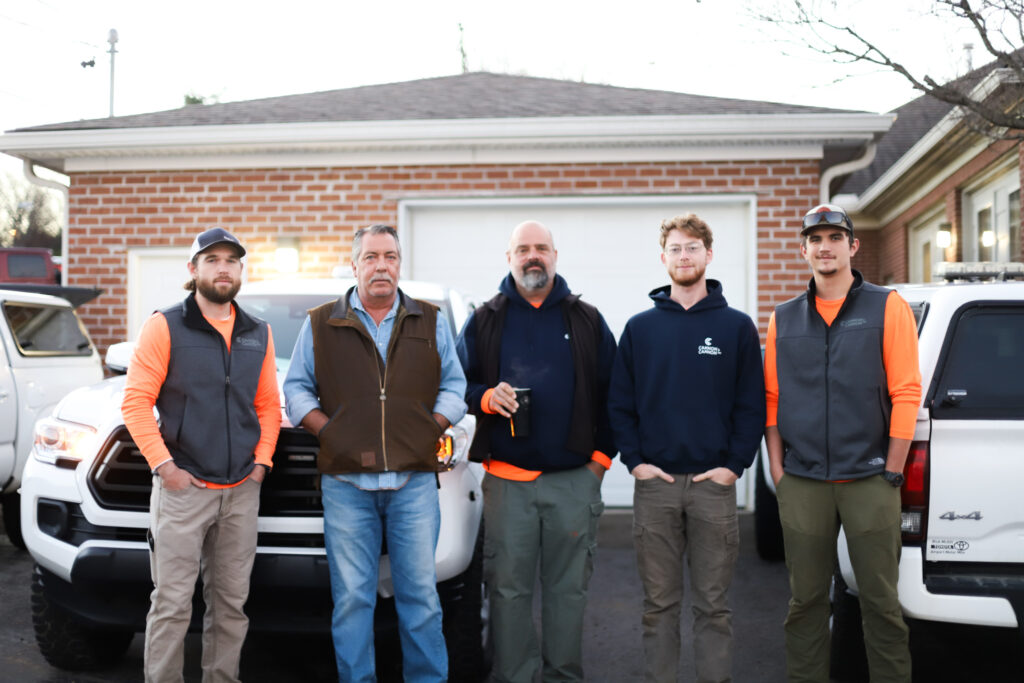John Winter has stepped into his new role as Survey Team Lead at Cannon & Cannon, Inc. (CCI), marking a new chapter for field survey in the company. Bringing years of field experience and innovative vision, John’s leadership is ensuring CCI Survey stays at the forefront of the industry. In this interview, John shares his insight on modern survey techniques, the CCI Survey team, and how we are shaping projects across Tennessee. Get an inside look at CCI’s approach to survey excellence and our commitment to client success.
To start, can you tell us a bit about your role as the Survey Team Lead at CCI and what your team does on a day-to-day basis?
At the beginning of the year, I took over the role as Survey Team Lead after being the main CCI office technician for the past 27+ years. Bob Lusby, who has led our survey team for 27 years, has decided to pull back and concentrate on boundary calculations and processing drone data collected by our field crews.
Our survey crews typically work 10-hour days, four days a week collecting field data for a wide range of project types and clients. Most of our work consists of utility route surveys, easement documents, ALTA surveys for commercial properties, and boundary and topographic surveys for commercial development.

Could you walk us through a typical land survey project from start to finish?
Most projects that begin at CCI start out as a request for a specific type of survey, whether it is for utility, commercial or private development, they all follow a similar process from start to finish. When a client requests a survey, we perform the necessary research to get a firm understanding of what the project will require. Property and utility research are two of the main areas of focus during this initial step.
With the research completed, a field data packet is created for the field crews to use to understand the scope of the project and to formulate a plan to complete the field portion of the project in a timely manner while maintaining the level of quality that we have become known for. When the field work is complete, the data and supporting documentation are given to the office personnel to begin processing. This begins with cleaning up the field files and importing the data into the software required for each job, whether that be Autocad Civil 3D or Microstation Open Roads Designer. This is followed up by the creation of the finished drawings and documents that are then passed on to the client or our CCI staff for planning and design purposes.
Why is professional surveying so crucial to the success of a development project?
A complete and accurate field survey conducted by a competent and licensed surveyor is a must for any property that is being developed. Not only will potential lenders want to see a current survey, engineers and planners need to see what the condition and limits of a property are so they can maximize the development potential for any given project.
CCI’s survey team prides itself on “mixing cutting-edge technology with decades of field-tested experience.” In your view, what sets Cannon & Cannon’s survey team apart from others in the industry?
For the most part, it is the quality of our people and their willingness to embrace new technologies. We have been extremely fortunate to have an experienced core of licensed surveyors and support personnel to complete the projects that we work on every day. We have four people in our group that have worked together in the surveying profession for over twenty six years here at CCI and it has been rewarding to see our folks, young and old, move from the old total stations and three-man crews, through robotic total stations, to various versions of GPS equipment and now LIDAR drones to perform our daily work. We have also been fortunate that our younger crew members are just as enthusiastic about embracing new technologies as well. They are the future of our group and it is great to see them grow and take on more responsibilities.

The CCI Survey Team
How is your team leveraging modern technologies like drones and LIDAR, and what new surveying tech or trends are you most excited about?
Drones, especially those equipped with LIDAR hardware, have been a game changer in many ways. While we have found that they are not the best tool for every job, we have identified where the technology works best for different applications, whether they be large topographic surveys, capturing clear digital imagery of potential development sites, or roadway corridors to videos of utility infrastructure to keep employees away from hazardous situations.
Both municipal projects and private developments rely on surveying. In your experience, are there differences in how you approach a city infrastructure project versus a private development project?
Honestly no. While each client can have a different need or required end product, we approach every project the same with equally high standards, effort and level of detail since the process is typically the same.
For municipalities or developers seeking survey services, what advice would you give them for choosing the right surveying partner?
First and foremost, choose a licensed surveyor that has experience in the specific task you require. Make sure that they have worked on a number of projects that are similar to what you are proposing. Don’t just choose the cheapest surveyor that you come across and hope everything works out. Remember, the survey that you start with is the foundation of your entire project. Second, consider if the firm that you are choosing has the staff and equipment to finish the job in a timely manner. We have had many clients over the years come to us after working with another firm that could not meet deadlines and were costing them time and money. We all know that delays happen but sometimes a firm just isn’t a good fit for a project.
Recognizing and respecting limitations is also an important aspect of project / time management. We have declined several projects over the years because they were outside of our area of expertise or or had schedules we could not confidently meet, understanding that accepting them could risk delays. We also understand that we are not best placed for small residential projects and typically refer those types of jobs to some of the smaller firms in town but conversely, many times the smaller firms are not well suited for the types of larger, more complex projects that better align to our capabilities.
Finally, what do you find most rewarding about your work in surveying and leading CCI Survey?
For me, the most rewarding part of surveying is creating maps that become part of the history of our area. I am always amazed when we work on a project and we pull maps from the register of deeds office that are 40 or 50 years old or more. We have even worked with some maps that are from the 1800’s. To think that a map that I have created while at CCI may someday be used by someone a century from now is humbling. To be able to be a tangible part of our local history is an amazing thing that most professions don’t give you.
As for stepping into the role of leading our survey team, I hope that I can continue the work and maintain the example that has been placed before me by my friend and mentor Bob Lusby. I appreciate the opportunity to continue pushing our department to continue the level of success that we have achieved and growing our team as the industry advances. We have an amazing group of people around us and they are as driven as I to continue to make CCI a respected contributor to our community.

